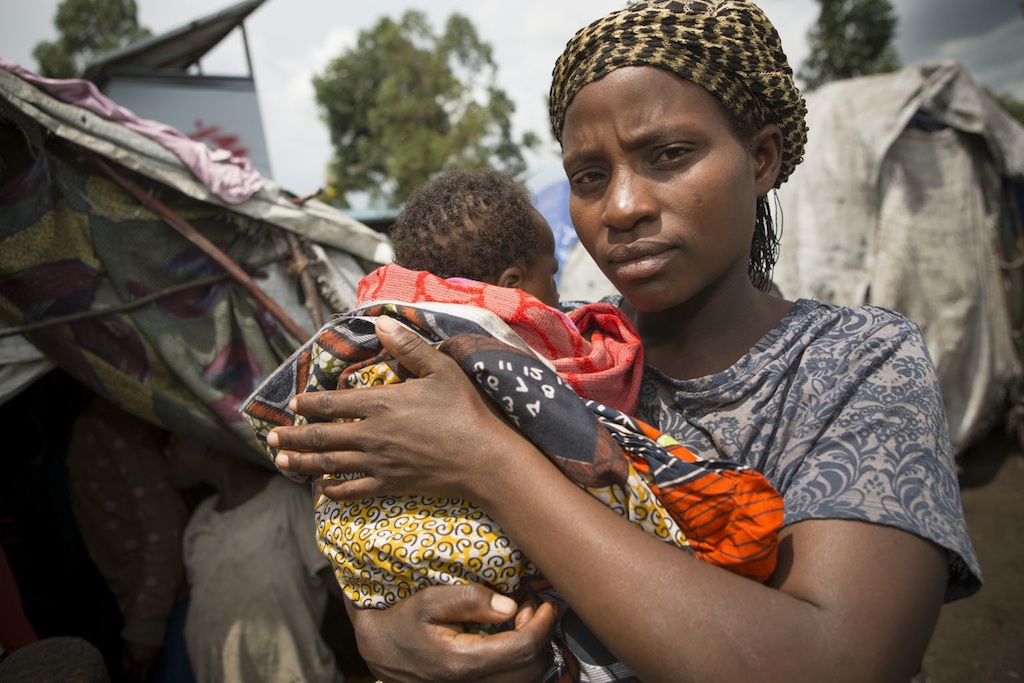
By Adel Sarkozi, CARE International
Ask women in rural Africa when they were born, and they would invariably answer you surprised, full of uncertainty: "I think it was in 1981 or 1982."
Ask women displaced in the camps scattered across the region of North Kivu, DR Congo when they've fled their villages, and they'll say: "We've fled sometime in August" or "we've been here for a month or maybe two."
Ask the same women when they got raped, and they'll say: "on the 22nd of October 2012" or "last Friday" or "yesterday."
In 37-year-old Josephine's case it was last October, on the 22nd, late afternoon.
She was on the outskirts of the camp, collecting firewood. She was alone. She was tired. She was worried about what she would give to her eight children to eat that evening.
She was also five months pregnant.

Photo: Josephine with her baby at Lac Vert camp, DRC/CARE
It happened near Lac Vert camp (on the outskirts of Goma town). She's been taking refuge in the camp with her children since last August, after having fled fighting in their home region of Masisi. She got lost from her husband on the way to the camp. Since then they spoke on the phone, and he sent her money a few times. But she has never heard from him again after she told him about her ordeal.
"I don't think he has accepted it though he said to me that he did. But since then, he has not contacted me again. He has also stopped sending money. He is not supporting the children in any way."
She looks up, and touches her face, her eyes, then continues.
"It was difficult after it
Her voice becomes hoarse. "They don't talk to me, they wouldn't even touch my baby. 'How can she have a child without a husband?' they say."
"But I have to live here. I have nowhere to go. I don't know if the fighting has stopped [back home]. I live here, in misery. I can't explain how hard my life is." She looks down at the sleeping baby in her arms. "I don't even have socks to put on the baby."
She reminisces on her life before the troubles: a husband; food for everyone; a big house; a small business. "Now look at this tent. There is nothing here."
What's worst, she is constantly worried about her children, especially about her four girls. The eldest one is 14.
"What if the same thing happens to her as it happened to me? She gets sometimes lost in the camp. For up to a week, I would not know where she is until we find her... What happened to me is not just my problem. It is the problem of many women here... When I hear that someone went through the same thing as me, I find her and go with her to the health clinic."
It's important to talk about what has happened, she says, and to seek help. "Speaking to the educators was like regaining my spirit. When I don't talk to someone, I just stay in my tent and cry."
Her dream? To be able to send her children to school again. To not have to worry. To live peacefully again. To be in a stable place.
But for now, she is here. On this burnt earth, amidst fluttering tents, and suffering. Where women get raped every day. And where sister helps sister.
NOTE: As of March 13, there are more than 40,000 people displaced in camps, sites on the outskirts of Goma. There are over 24,000 people living in the camp Lac Vert. CARE International works in three camps on the outskirts of Goma, including Lac Vert, training educators to offer support and advice to sexual violence survivors on how and where to access medical care. The educators also provide advice on the measures that can be taken to avoid attacks, and work with men to address the attitudes and traditions, which make women vulnerable to violence.
CARE provides financial support as well to sexual violence survivors and other vulnerable groups so that they can start businesses such as selling cooked food or goods in the camp. This initiative not only helps them regain both a sense of normality and of dignity, but also prevents them from being exposed to further sexual violence as they are at less risk of falling prey to harm while searching for firewood and water, and less likely to turn to prostitution. On March 17, CARE provided 186 cash transfers to sexual violence survivors and other vulnerable people in Lac Vert camp. Josephine was one of the beneficiaries.
CARE's sexual and gender-based violence project at Lac Vert camp was visited by British Foreign Minister and Angelina Jolie on March 25, 2013. Hague and Jolie wanted to see first hand the impact of sexual and gender-based violence on women in DRC. The visit took place in the lead up to the G8 meeting on April 11, London, when for the first time in the G8's history, the issue of sexual violence against women will be discussed.